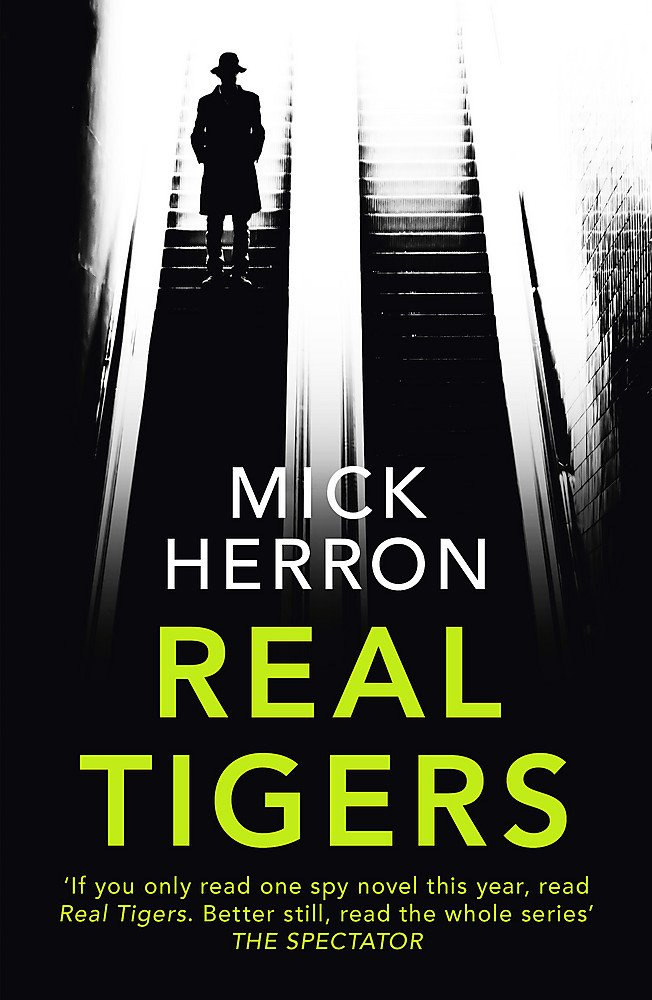Real Tigers by Mick Herron
Mick Herron's third entry in the Slough House spy series is as good and as entertaining as many of John le Carre's modern works.
A British spy, considered a nobody by most, is kidnapped in the middle of London. A shrewd second-in-command plots the downfall of her superior. A self-assured but socially awkward cyber espionage expert tries to please the ladies with the worst possible pick-up lines. Games - the tigers of the title - are set in motion and prove difficult to stop.
Real Tigers is the third entry in Mick Herron’s Slough House series. Slough House is where failed agents and operatives are sent when the MI6 can’t be bothered to sack them. They’re given mind-numbingly boring bureaucratic work in the hopes that it will compel them to quit on their own. Slough House is led by Jackson Lamb, an inimitable curmudgeon with a not-so heart of gold. Lamb is the thematic centre of the series, but he mostly stays away from the running and gunning that his operatives undertake. The rest of the cast changes slightly between books and there’s no main hero to root for, although a few like River Cartwright, a son of a retired MI6 maverick, stick around for longer.
Herron’s unconventional approach means that no one is safe. This helps bring a sense of real danger to a genre that often signals well in advance who is expendable and who isn’t. Many previous inhabitants of Slough House now lay dead by the wayside and Real Tigers spares neither the innocent nor the brave. Herron also understands the consequences of death and how those who are left behind carry the weight with them. This series was never about gunning down unnamed enemies by the dozen. Guns are treated as dangerous, unnecessary even, as they force confrontation. Spies, it seems, prefer to talk things over.
Surprisingly, one of the shadier characters is, as far as I can tell, a carbon copy of the real life Boris Johnson. Real Tigers is not a roman à clef, and no other character seems to be a fictionalised versions of an actual person. But the similarities are too obvious to not point out. Peter Judd, Johnson’s image in Real Tigers, is quickly climbing the political hierarchy and scrambling to push aside the current prime minister and take his spot. He’s a populist that knows how to look approachable and affable for the cameras: another man of the people. Behind closed doors, however, he’s a toxic combination of ambition, back stabbing and sociopathic tendencies. His disheveled look and unkempt hair are only a front. Behind closed doors he switches back to his Etonian accent and uses his power and position to harass his underlings.
It’s worth noting that Real Tigers came out in 2016, before Boris the Prime Minister and the Brexit vote. As such, it has an air of unintended prescience for 2022. Heat waves, naïve bureaucracy (regarding Brexit, COVID and inflation) and Johnson’s escapades have all been fixtures of British news this summer. Real Tigers is great detective fiction, but it also carries thematic heft. It identified the cultural undercurrents of the mid 2010s that would go on to shape the next ten years.
More recommended reading
Ezra Klein makes a compelling case that smartphones, as a medium of information and discovery, are even worse than we feared: I Didn’t Want It to Be True, but the Medium Really Is the Message.
Matt Stoller predicted The Slow Death of Hollywood in 2019 and things have looked even worse since. Most great movie franchises were built on delighting and surprising the audience (consider the original Star Wars, Back to the Future and The Hangover). But nobody is doing that anymore.
Will O’Brien shows that there is No Great Stagnation in Guinness (Guinness being the Irish beer). Did you know that scientists at Guinness invented the Student’s t-test? The history of Guinness is longer and stranger than you expect.




